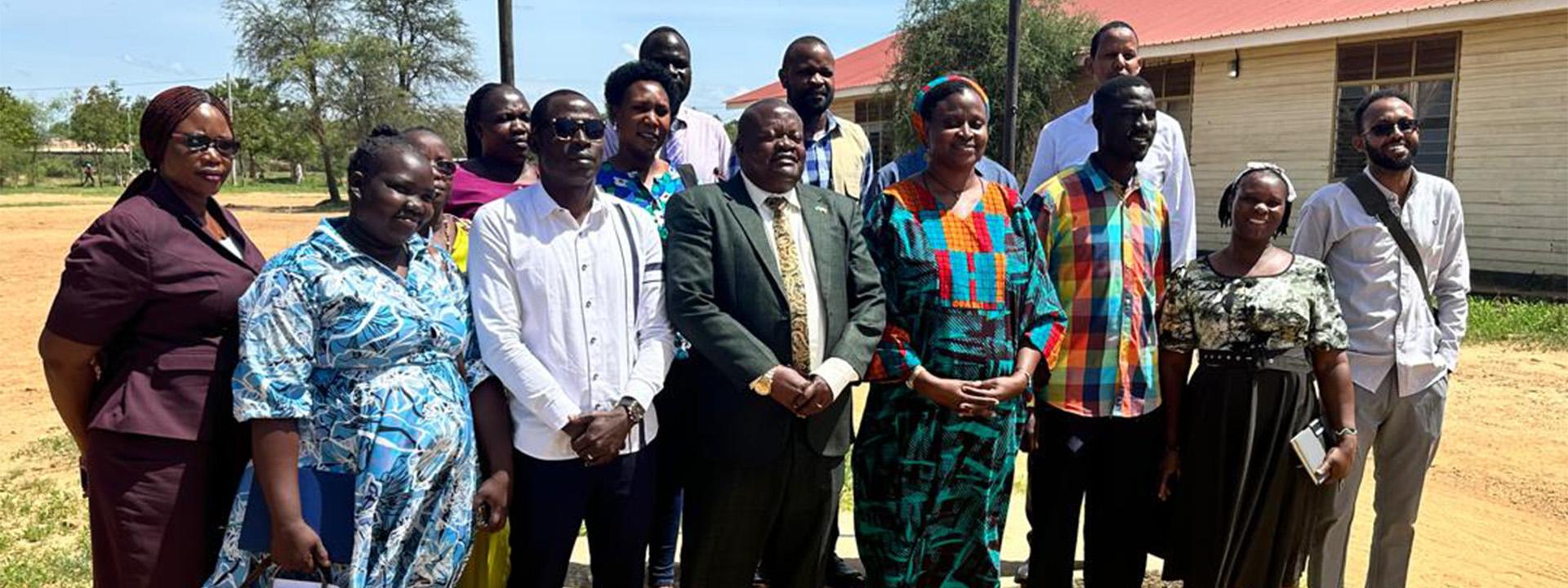April 2, 2025 (Kotido, Uganda): The Intergovernmental Authority on Development (IGAD), through its Land Governance Unit, in collaboration with Kotido Municipality and with support from the African Development Bank (AfDB), is set to launch a tree planting initiative in Kotido Municipality on April 3, 2025. As part of the preparations, IGAD and its partners conducted local-level consultations to ensure the initiative’s success and long-term impact.
The consultations brought together key stakeholders, including the Resident District Commissioner (RDC) of Kotido District, the Mayor of Kotido Municipality, the Town Clerk, municipal councillors, and officials from the departments of Physical Planning, Education, and Environment. Representatives from AfDB, technical experts from Uganda’s Ministry of Lands, Housing and Urban Development, and the Ministry of Water and Environment also participated, alongside members of civil society organizations and grassroots women leaders.
Objectives of the Initiative
The tree planting initiative aims to enhance environmental sustainability while supporting climate adaptation and mitigation efforts. By planting indigenous and multi-purpose trees, including shade and fruit trees, the initiative will promote greening and afforestation at community, educational, and institutional levels. This effort will not only contribute to long-term environmental conservation but also improve local livelihoods. Additionally, the initiative seeks to raise awareness about the dangers of deforestation and the benefits of sustainable land management, ensuring that communities in Kotido Municipality actively participate in preserving their natural resources for future generations.
The local consultations aimed to secure support from local government officials for the upcoming tree planting exercise, verify the supply of tree seedlings, tools, and water tanks to schools, engage with beneficiaries of AfDB-sponsored training on land and gender-transformative climate adaptation to assess its impact, and facilitate dialogue with development partners supporting the initiative.
Key Remarks
In his opening remarks, RDC Charles Ichogor commended IGAD’s commitment to Kotido through its various initiatives, including the development of land use plans for Kacheri Sub-County and the training of women leaders on land governance and climate resilience. He emphasized that this is not just a tree planting exercise but a tree-growing initiative, highlighting that while planting is easy, nurturing and maintaining trees requires long-term commitment. He assured the local administration’s support for the initiative, which is expected to reduce soil erosion and play a crucial role in carbon sequestration.
In a speech delivered on his behalf, Town Clerk Emmanuel Okaja noted that Kotido Municipality is one of only two municipalities in the Karamoja sub-region and the youngest. He highlighted that urbanization is outpacing planning efforts, making environmental and climate change initiatives in urban areas a critical area for investment. He welcomed the timely and much-needed initiative, expressing confidence that it will make Kotido a more livable municipality for its residents.
Mayor Peter Abrahams Irar acknowledged the challenges faced by Kotido as a rural and marginalized region, calling on development partners to support its sustainability efforts. He noted that the provision of 5,000 tree seedlings represents a significant investment in greening Kotido, particularly in addressing the rampant cutting of trees for fencing and energy needs.
IGAD’s Head of Mission to Uganda and Land Governance Coordinator, Joselyn Bigirwa, provided an update on the AfDB-funded project on enabling gender equality in access to land resources, which is being implemented in Kenya, Uganda, and Djibouti. She emphasized that this initiative was identified through gender and power analysis study as well as training sessions with women leaders in the region. As a result, it is designed as a community-led initiative to ensure sustainability and local ownership.
IGAD is providing 5,000 tree seedlings, along with tools, water tanks, and energy-saving stoves. The initiative specifically targets institutions such as schools, as well as individual community members, with a focus on women. Women in Kotido bear significant responsibility for household tasks such as firewood collection and fencing, making them central to environmental conservation efforts.
Mr. Bela Emile KOUAKOU, Programme and Communication Officer at the Africa Climate Change Fund (ACCF) Secretariat under the African Development Bank (AfDB), emphasized AfDB’s role as Africa’s premier development institution in supporting the African Union’s Agenda 2063. He acknowledged that while this initiative is a small step in addressing the vast challenges of climate change, it remains a crucial and meaningful one.
He expressed gratitude for the support from the district, municipality, and local communities, recognizing their commitment as a strong foundation for sustainability. Mr. Kouakou noted that for a long time, development efforts followed a top-down approach, which proved ineffective in many cases. However, AfDB is now prioritizing bottom–up development, ensuring that interventions are guided by the needs and priorities of communities at the grassroots level. He reiterated that local ownership and active participation are key to ensuring the long-term success of such initiatives, making sustainability a core priority for the Bank.
IGAD’s Support and Next Steps
IGAD in collaboration with the Kotido District and Municipality will undertake Tree planting at selected institutions, Community-wide awareness campaigns, including barazas, informational materials, and engagement of local leaders, Distribution of tree seedlings to community members, particularly women, to encourage household-level participation and Provision of energy-saving stoves to reduce reliance on firewood and mitigate deforestation. IGAD has also established Local Steering Committees (LSCs), composed of municipal and community representatives, which will oversee implementation, monitoring, and sustainability efforts. IGAD will facilitate two joint monitoring missions to evaluate progress, gather lessons learned, and explore opportunities for scaling up similar initiatives across the region.
Integrating community-led approaches, environmental education, and sustainable land management practices is a testament of IGAD’s commitment to fostering climate resilience in cross-border pastoralist areas.

